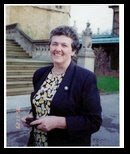

Erie Benedictines: Why we said no to the Vatican demand
August 2001
In this press statement, Benedictine Sr. Christine Vladimiroff, prioress of
Joan Chittister’s Erie, Pa., community, explained their deliberations with the
Vatican. For more background, visit www.eriebenedictines.com
For the past three months I have been in deliberations with Vatican officials
regarding Sister Joan Chittister’s participation in the Women’s Ordination
Worldwide First International Conference, June 29 to July 1, Dublin, Ireland.
The Vatican believed her participation to be in opposition to its decree
(Ordinatio Sacerdotalis) that priestly ordination will never be conferred on
women in the Roman Catholic Church and must, therefore, never be discussed.
The Vatican ordered me to prohibit Sister Joan from attending the conference
where she is a main speaker.
I spent many hours discussing the issue with Sister Joan and traveled to Rome
to dialogue about it with Vatican officials. I sought the advice of bishops,
religious leaders, canonists, other prioresses, and most importantly, my
religious community, the Benedictine Sisters of Erie. I spent many hours in
communal and personal prayer.
After much deliberation and prayer, I concluded that I would decline the
request of the Vatican. It is out of the Benedictine, or monastic, tradition
of obedience that I formed my decision. There is a fundamental difference in
the understanding of obedience in the monastic tradition and that which is
being used by the Vatican. Benedictine authority and obedience are achieved
through dialogue between a member and her prioress in a spirit of
co-responsibility, always in the context of community. The role of the
prioress in a Benedictine community is to be a center of unity and a guide in
the seeking of God. While lived in community, it is the individual member who
does the seeking.
Sister Joan Chittister, who has lived the monastic life with faith and
fidelity for 50 years, must make her own decision based on her sense of
Church, her monastic profession and her own personal integrity. I do not see
her participation in this conference as “a source of scandal to the faithful”
as the Vatican alleges. I think the faithful can be scandalized when honest
attempts to discuss questions of import to the church are forbidden.
I presented my decision to the community and read the letter that I was
sending to the Vatican. 127 members of 128 eligible members of the Benedictine
Sisters of Erie freely supported this decision by each signing her name to
that letter. Sister Joan addressed the Dublin conference with the blessing of
the Benedictine Sisters of Erie.
My decision should in no way indicate a lack of communion with the Church. I
am trying to remain faithful to the role of the 1500-year-old monastic
tradition within the larger Church. We trace our tradition to the early Desert
Fathers and Mothers of the fourth century who lived on the margin of society
in order to be a prayerful and questioning presence to both church and
society. Benedictine communities of men and women were never intended to be
part of the hierarchical or clerical status of the Church, but to stand apart
from this structure and offer a different voice. Only if we do this can we
live the gift that we are for the Church. Only in this way can we be faithful
to the gift that women have within the Church.
© 2001, Benedictine Sisters of Erie, Pa.























